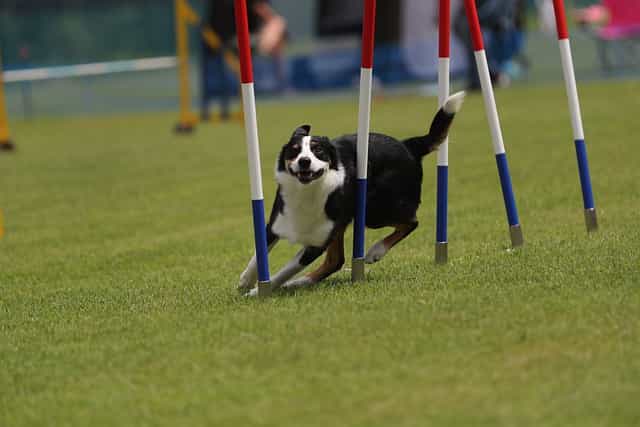
Do Border Collies bite? The answer is yes, like any breed of dog, Border Collies have the potential to bite. However, the likelihood of a Border Collie biting is generally low if they are properly trained and socialized.
Causes of Biting in Border Collies
Fear and Stress
Fear and stress are common causes of biting in Border Collies. When they feel threatened or scared, they may bite as a form of self-defense. This behavior can be triggered by loud noises, unfamiliar people or animals, and new environments. To prevent biting due to fear and stress, it is essential to socialize your Border Collie from an early age and expose them to different situations gradually.
Pain and Health Issues
Pain and health issues can also cause biting behavior in Border Collies. When they are in pain, they may bite as a way of expressing discomfort. Health issues such as dental problems, arthritis, and injuries can also cause biting behavior. It is essential to take your Border Collie to the vet regularly and address any health issues promptly.
Boredom and Frustration
Boredom and frustration can also lead to biting behavior in Border Collies. When they are not mentally or physically stimulated, they may resort to biting as a way of releasing pent-up energy. Providing your Border Collie with enough exercise and mental stimulation can prevent biting due to boredom and frustration.
Trauma and Abuse
Trauma and abuse can also cause biting behavior in Border Collies. Dogs who have been abused or traumatized may exhibit aggressive behavior, including biting. It is essential to provide a safe and nurturing environment for your Border Collie and seek professional help if you suspect they have been abused or traumatized.

Signs of Aggression in Border Collies
Growling and Barking
Growling and barking are common forms of communication for dogs, but it can also be a sign of aggression in Border Collies. If your Border Collie is growling or barking excessively, it is important to understand why. It could be due to fear, anxiety, territorial behavior, or aggression. If your Border Collie is growling or barking at strangers or other animals, it is important to monitor their behavior and intervene if necessary.
Unwanted Behavior
Unwanted behavior can also be a sign of aggression in Border Collies. This can include biting, nipping, jumping, or lunging. If your Border Collie is exhibiting any of these behaviors, it is important to address the behavior immediately. Training and socialization can help prevent unwanted behavior in Border Collies.
Protective Instincts
Border Collies have a protective instinct that can sometimes be mistaken for aggression. They are loyal and protective of their owners and can become aggressive if they feel their owner is being threatened. It is important to train your Border Collie to understand what is and is not a threat to avoid any dangerous situations.
Training to Prevent Biting
As with any breed, it is important to train your Border Collie to prevent biting. Here are some tips to help you train your furry friend to be well-behaved and non-aggressive.
Socialization and Exercise
Socialization and exercise are two essential components of preventing biting in Border Collies. Early socialization with other dogs and people can help your puppy learn how to interact with others in a positive manner. Exercise is also important to keep your Border Collie healthy and to reduce any pent-up energy that could lead to aggressive behavior.

Positive Reinforcement
Positive reinforcement is a great way to train your Border Collie to not bite. Praising your dog for good behavior and giving them treats when they do well can help reinforce positive behaviors. This can help create a bond between you and your dog, which can lead to better obedience in the long run.
Professional Training
If you are having trouble training your Border Collie to not bite, consider hiring a professional dog trainer. They can provide you with advice and techniques to help you train your dog effectively and safely.
Creating Boundaries
Creating boundaries is important to prevent biting in Border Collies. This includes providing your dog with chew toys, setting up boundaries in your home, and establishing rules for your dog to follow. This can help your dog understand what is expected of them and reduce any confusion or frustration that could lead to biting.
Remember that training your Border Collie to not bite takes patience, attention, and discipline. With positive reinforcement and consistent training, your furry friend can become a well-behaved and non-aggressive member of your family.
Health and Care of Border Collies
Physical and Mental Stimulation
Border Collies are highly energetic and require both physical and mental stimulation. They are eager to please and enjoy playtime with their owners. Regular exercise and playtime in dog parks can help keep them physically and mentally fit. However, it is important to note that they are sensitive dogs and can become overstimulated if not given enough rest.
Health Issues
Border Collies are generally healthy dogs, but like all breeds, they are prone to certain health issues. These include hip dysplasia, epilepsy, and eye problems such as progressive retinal atrophy. Regular visits to the vet and proper care can help prevent and manage these issues.
Care and Attention
Border Collies are loyal and friendly dogs that require a lot of attention and interaction with their owners. They are mentally and physically active dogs that need a lot of care. Regular grooming and proper nutrition can help keep them healthy and happy.

Understanding Border Collie Behavior
Herding Instincts
Border Collies are known for their herding instincts. They were bred for herding livestock, and this instinct is deeply ingrained in their behavior. This means that they may try to herd anything that moves, including children, other pets, or even cars. It’s important to understand this aspect of their behavior and provide them with appropriate outlets for their herding instincts.
Intelligence and Temperament
Border Collies are highly intelligent and have a strong work ethic. They are also known for their intense focus and drive. This means that they require plenty of mental and physical stimulation to stay happy and healthy. They thrive on learning new things and performing tasks, so training and regular exercise are essential for their well-being.
In terms of temperament, Border Collies are generally friendly and affectionate with their families. However, they can be reserved or even aloof with strangers. They may also exhibit some herding behaviors, such as nipping at heels or circling around people or objects.
Frequently Asked Questions

Are Border Collies prone to biting?
Border Collies are not inherently prone to biting, but like any dog, they may bite if they feel threatened or scared. It is important to socialize your Border Collie from a young age and provide proper training to prevent biting behavior.
What should I do if my Border Collie bites someone?
If your Border Collie bites someone, seek medical attention immediately if necessary. It is important to report the incident to authorities and provide information about your dog’s vaccination history. Additionally, seek professional help to address the underlying cause of the biting behavior.
How can I train my Border Collie to stop biting?
Training your Border Collie to stop biting involves positive reinforcement techniques, such as rewarding good behavior and redirecting negative behavior. Consistency and patience are key in training your Border Collie to stop biting.
What are some common reasons why Border Collies bite?
Border Collies may bite due to fear, anxiety, territorial behavior, or lack of socialization. It is important to identify the root cause of biting behavior in order to address it effectively.
Can Border Collies be trained not to bite?
Yes, Border Collies can be trained not to bite through positive reinforcement training methods and proper socialization. It is important to seek professional help if your Border Collie exhibits biting behavior.
Are Border Collies more likely to bite than other breeds?
No, Border Collies are not more likely to bite than other breeds. However, like any dog, they may bite if they feel threatened or scared. Proper training and socialization can help prevent biting behavior in all breeds of dogs.